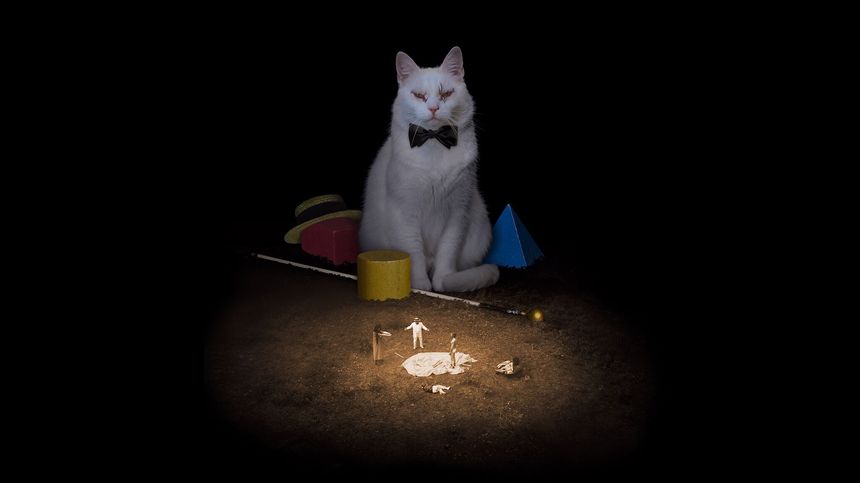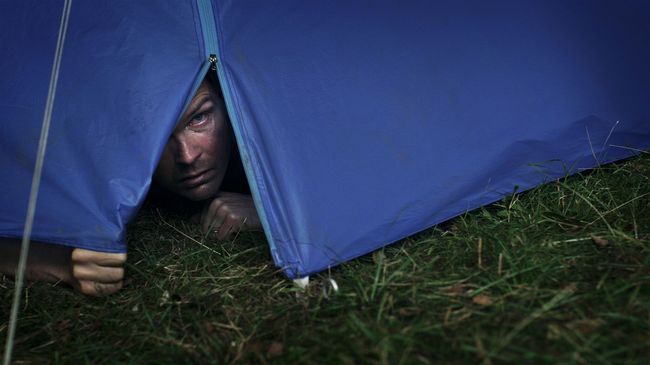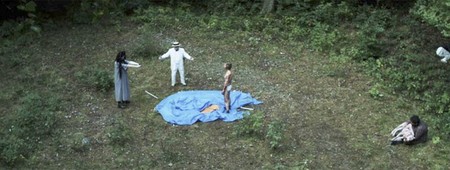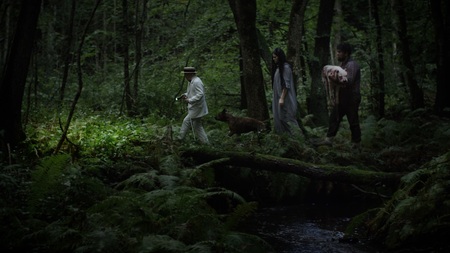Rotterdam 2019 Review: KOKO-DI KOKO-DA, Sophomore La-Di-Da

Swedish filmmaker Johannes Nyholm jumped into the limelight of the international arthouse circuit with both feet, sweeping audiences and awards with his feature debut The Giant. It was a touching dramedy, absolved of sentimentality, about an autistic boy separated from his mother and convinced that winning the Scandinavian Championship of pétangue will win her back.
A very mature offering, wherein Nyholm capitalized on his previous formalistic experiences and the unconventional storytelling of The Giant, combining the inside and outside worlds of the protagonist, earned Nyholm a rising-filmmaker-to-follow spot. The expectations revolving around his latest project proved to be high, since his sophomore feature Koko-di Koko-da screened at Sundance, Rotterdam and Goteborg film festivals in quick succession.
Koko-di Koko-da, the title taken from a nursery rhyme sung and uttered several times in the course of the film, introduces a young clan of Elin, Tobias, and their daughter Maja. A family idyll of what seems like an Easter egg hunt during the celebration of Maja's 8th birthday, all three sporting childish bunny make-up, gets disrupted by Elin's violent sickness. A prompt air-borne transfer to hospital and a night at an emergency room lead to a drastic and perverse twist of fate.
The director fast-forwards to Elin and Tobias travelling to a camp trip. A palpable marital tension materializes as Tobias pitches a tent impromptu in the middle of a dark forest to Elin's vocal objections. As Elin goes to relieve herself before the crack of the morning, a white cat and the tune of Koko-di Koko-da bring in an uncanny trio unleashing a series of unmotivated sadistic acts upon the hapless couple. The Swedish writer-director puts a denouement on hold as he respawns to the initial moment of Elin needing to go to relieve herself in a useless expectation that the course of awkward events will have a vastly different outcome (probably too literal a definition of insanity).
And from that moment on, Koko-di Koko-da turns into a macabre, vicious circle on a loop, having Tobias witness Elin's humiliating demise, while awaiting his go. Nyholm pulls out von Trier's Antichrist meeting Groundhog Day in laconic and absurdist Scandi poetics. The nightmarish, claustrophobic and cryptic plot suggest Koko-di Koko-da to be a tense allegory on loss, grief, pent-up anger, anxiety and impotency for a resolution breeding devastating results.
In a conceptual plane, Nyholm's latest oeuvre does not sound that bad, however, it desperately lacks a depth and complexity offered by von Trier's infamous sado-masochistic observation of grief (and female empowerment) in a feral psychoanalytical session gone savage. While Koko-di Koko-da even brushes lightly Haneke's brand of social horror, the skim remains way too short-lived, as Johannes Nyholm falls victim to his own jagged symbolism.
The psychopathic party of three consists of a frisky elderly man in a white suit, a tall girl as if lifted from a Japanese ghost film and a brute homunculus-like man in an infantile outfit. The unthreatening picture of the lot adorns a music box Maja ogles in the beginning of the film, though it is hard to imagine innocent toy for kids becoming a Hellraiser-puzzle-box-like conduit for nonsensical torture.
Koko-di Koko-da merges a twisted fairy tale (before they became Disneyfied) and a family drama, blending them together in an arena of subconsciousness doubling as a self-flagellating Sarterian limbo.
The apparition of the unholy trinity triggers Freudian alarm on psyche's tripartite of super-ego, ego and id, though that perspective remains opaque. Given the tension between the couple, it is unlikely to imagine the agonizing spectacles to be a self-punishing, collective delusion. Besides, the manner in which Nyholm stages the encounters strongly suggests a commentary on the pitfalls of modern masculinity, as Tobias fails to demonstrate any trait of a knightly stance, despite the apparent premonition of bloodshed to come.
In a transitory moment of hope, the chain of torment breaks as Elin flees through a dark forest and witnesses another kind of spectacle, a shadow play. Johannes Nyholm inserts a short intermission in the form of a mournful bunny fable, illuminating the going-ons of Koko-di Koko-da and its central premise. That is the Swedish writer-director's strength, tiny chunks of unorthodox storytelling, and testing formalistic and genre boundaries. The bunny shadow play fable possesses the same emotional power of Maja's birthday in hospital, however, it's less raw and more lyrical.
As an accomplished music video maker, he is accustomed to the process of delivering more on a small space (hence the shadow play resembling the one he did for Little Dragon's music video Twice), however, the opposite happens on a large canvas of a feature film. To retain the narrative power of Koko-di Koko-da without diluting the emotional impact or metaphorical nature, Nyholm could confidently shave off 40 minutes of the current 78-minute running time of pointlessly reliving the martyrdom, and the result would remain more or less untouched. It is clear that the circle structure serves to emphasize the claustrophobic and seemingly hopeless dead-end; nevertheless after a third run, gratuitousness supplants the hopelessness.
While Koko-di Koko-da, compared to The Giant, displays what can be considered Johannes Nyholm's signature style, a fusion of fairy tale and realist drama, his feature debut fares better as a whole package. Paradoxically, Koko-di Koko-da suffers from the growing pains of a debut feature. It almost looks like it was shelved to make space for The Giant, which was tackled with a much more assured hand and clear and concise vision.
As a catalogue of Nyholm's skills, his own personalized bag of tricks, Koko-di Koko-da remains an apt demonstration, though it fails to become more than sum of its (repetitive) parts in the long run. Koko-di Koko-da warns to not take visionary filmmakers for granted, yet it does not extinguish Nyholms prominence as an artist to look for yet. Third timeis a charm.
Koko-di Koko-da
Director(s)
- Johannes Nyholm
Writer(s)
- Johannes Nyholm
Cast
- Leif Edlund
- Peter Belli
- Ylva Gallon
- Katarina Jakobson










